Where to Start When Studying Psychology
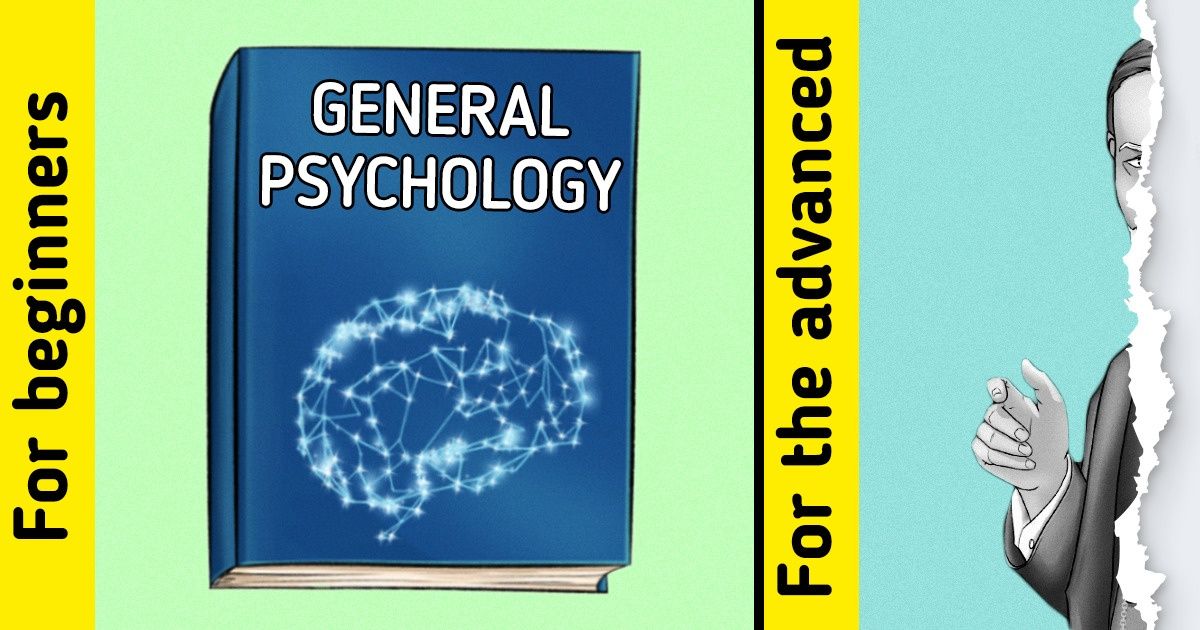
Psychology is a science that studies the functioning of the psyche and its effect on the behavior and character of an individual. Nowadays, it’s one of the most popular areas of study and evokes big interest in many people. Luckily, you don’t need to get a Ph.D. to know more about psychology — the basics of this science can be learned independently with the help of available resources. Of course, you won’t be able to work as a professional psychologist after this, but you’ll definitely broaden your horizons and learn to understand yourself and your surroundings better.
5-Minute Crafts created a detailed guide about where to start when attempting to learn about psychology, from basic principles to popular theories that formed the basis of modern methods of therapy.
1. Set a goal.
Think about why you want to study psychology. Here are several possible goals:
-
To broaden your horizons
-
To learn more about yourself and your character
-
To learn to understand your surroundings better
-
To improve your communication skills
-
To build a career having clearly set your goals and motivation
-
To help yourself in a difficult situation
Depending on your goals, select the sections of psychology that suit you best. For example, if you want to improve your communication skills, pay special attention to social psychology. If your goal is to help yourself in a difficult situation, learn popular directions in psychology and the methods they offer to overcome difficulties. If you simply want to broaden your horizons, gradually learn about sects of psychology that interest you most.
2. Find your resources.
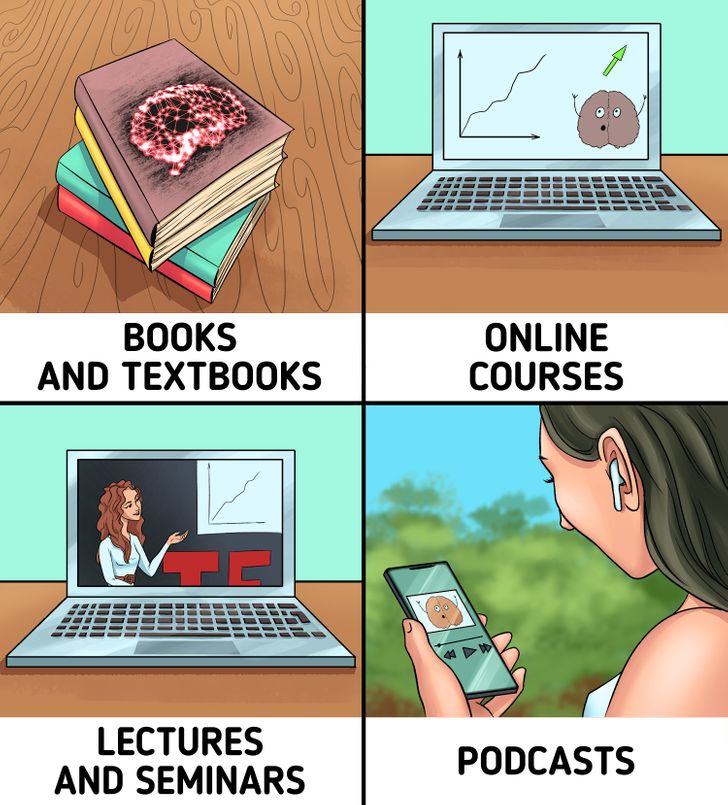
Use the following sources for studying psychology:
-
Books, textbooks, and scientific articles on psychology
-
Free online courses on popular internet platforms, such as edX and Coursera
-
Open lectures and seminars (attend them online or watch their recordings on the Internet)
-
Podcasts that speak about psychology as a science and that discuss issues and difficulties that we regularly face in life
-
Professional internet portals that speak on the main aspects of psychology in an understandable manner
3. Study the basics.
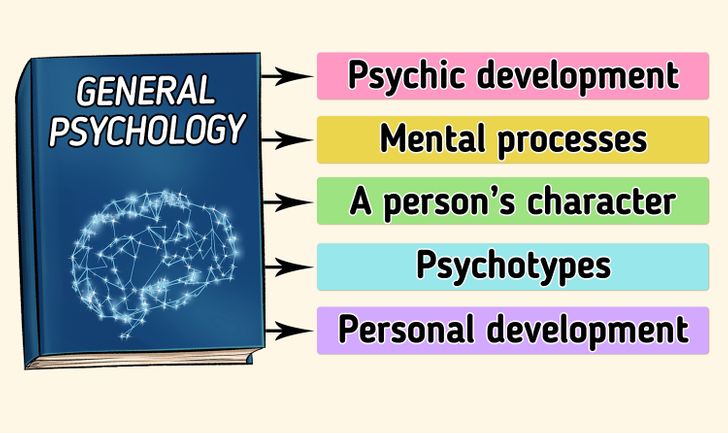
If you studied in a university, you’ve likely dealt with the subject known as “general psychology.” This summarizes theoretical knowledge and provides a basic understanding of psychology as a science.
From this course, you can learn about the following:
4. Go into deeper detail.
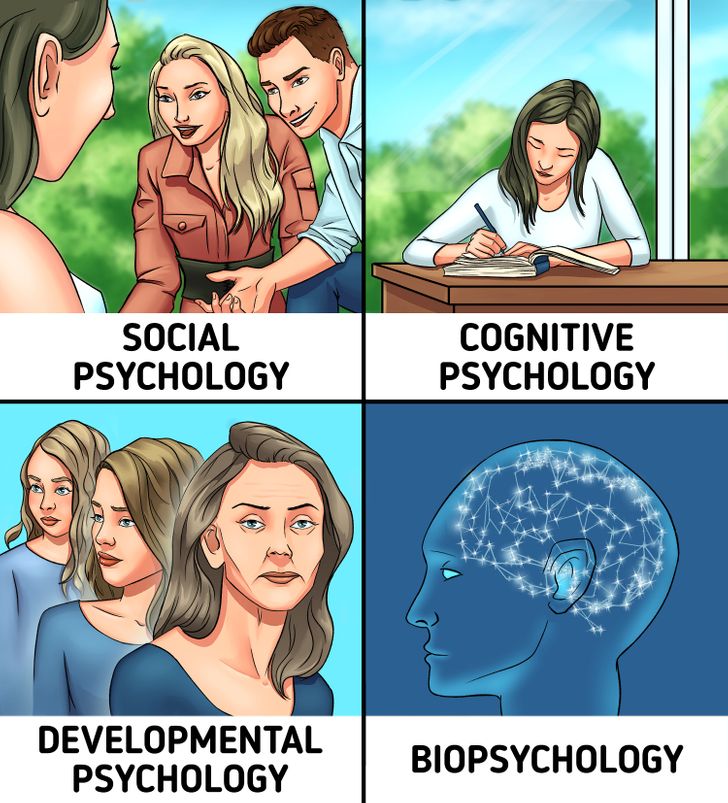
Psychology has many different sections that study certain specifics of individuals’ actions and their minds. Pay attention to the ones that go along with your ultimate study goals.
For example:
-
Social psychology studies all the aspects of relationships between individuals and offers ways to improve them. Research held by social psychologists helps us understand how people form attitudes toward each other and what influences their behavior.
-
Cognitive psychology studies how the human brain works, touching on how people think, perceive events, process new information, remember things, learn, and make decisions.
-
Clinical psychology studies mental, emotional, and behavioral disorders of a person, such as depression, PTSD, and bipolar disorder.
-
Developmental psychology studies how people develop and adapt to new conditions in different life stages from infancy to old age. It examines the specifics of the physical, intellectual, personal, and emotional growth of a person.
-
Biopsychology studies how the work of the brain and specifics of the nervous system affect people’s thoughts, feelings, and behavior.
5. Check the popular directions in psychology.
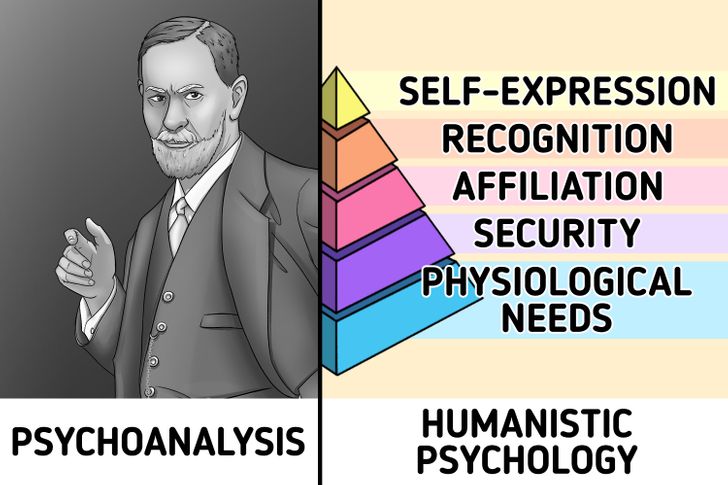
Apart from the different types, psychology also has separate directions. The most popular one is the theory of psychoanalysis that was developed by Sigmund Freud and got popular thanks to the efforts of his followers.
The directions in psychology often offer theories on personality development, methods of diagnosis, and treatment of mental disorders. At the same time, some of these directions limit those who study them to general emotional issues.
The following directions are good for a deeper study:
-
Psychoanalysis is a broad direction that includes the theory of personality structure, stages of its development, the study of defense mechanisms, and the formation of complexes. Sigmund Freud developed a method of treating neuroses based on the interpretation of conflicts, dreams, free associations, and the study of the obtained material with the subsequent restructuring of the psyche. The books written by Freud himself, as well as those of his followers, such as Anna Freud, Carl Jung, and Melanie Klein, will be helpful when studying psychoanalysis.
-
Gestalt psychology is a direction that studies the specifics of perception and thinking, putting forward the principle of integrity and completeness as an explanation of psychological conflict. Gestalt psychologists believe that an individual lives through a conflict over and over because it’s not completed. One needs to work it out and escape the situation before the emotional balance can be restored. When studying this theory, pay attention to the books of its founders, Max Wertheimer, Kurt Koffka, and Wolfgang Köhler.
-
Humanistic psychology studies the moral and social aspects of a human personality, including values, self-actualization, creativity, love, the desire for freedom, mental health, interpersonal communication, and much more. The most popular work in humanistic psychology is A Theory of Human Motivation by Abraham Maslow, which formed the basis of the famous hierarchy of needs.
-
Existential psychology investigates a human’s world and their being, discusses the meaning of life, and the act of overcoming anxiety. Initially, existentialism emerged as a philosophical movement but later transformed into psychological analysis and therapy. The works of Viktor Frankl, Rollo May, and Irvin D. Yalom will be helpful when studying this direction.
6. Include popular psychology on your to-read list.
There are many non-fiction books on popular psychology that can complement your knowledge with practical information. Read below for some examples of works in this sphere.
- Daniel Goleman — Emotional Intelligence: Why It Can Matter More Than IQ
-
Daniel Goleman, Heidi Grant, Amy Jen Su, and Rasmus Hougaard — Focus
-
Daniel Levitin— The Organized Mind
-
Carol Dweck — Mindset: The New Psychology of Success
-
Mark Williams and Danny Penman — Mindfulness: A Practical Guide to Finding Peace in a Frantic World
Bonus: useful tips to remember during your studies
-
Set a precise and achievable goal based on how much time you’d like to spend learning certain things. Then set intermediate goals with shorter deadlines. These can be certain topics and sections in psychology.
-
Make a study plan and make sure to regularly allot time for your studies.
-
Analyze the obtained information and write down theses. Review your notes regularly to help you remember what you’ve learned.
-
Find like-minded people by visiting open lectures, communicating on thematic forums, and taking online courses that offer an opportunity to exchange opinions with other students.